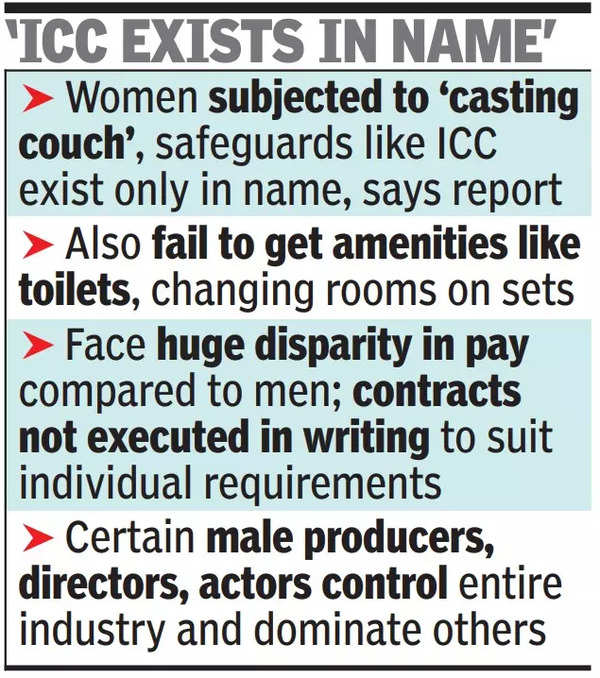THIRUVANANTHAPURAM: Justice Hema Committee report paints a sordid picture of humiliating “compromises” that women are forced to make to survive in Malayalam film industry, including being subjected to ‘casting couch‘ – having to dole out sexual favours to industry’s high and mighty or risking a premature end to careers. It shows that disparity in remuneration between men & women artists was huge and basic safeguard like internal complaints committees (ICCs) exist only in name.
Report of the 3-member panel of retired HC judge K Hema, yesteryear star Sharadha and retired IAS officer K B Valsala Kumari was released following a HC observation that its contents should be discussed by civil society to address and rectify issues faced by women in the industry.The committee was originally formed on demands by Women in Cinema Collective following Feb 2017 abduction and sexual assault of a leading female actor, a case still in trial stage and in which noted actor Dileep is among eight accused.
“In course of the study we understood that Malayalam film industry is under control of certain producers, directors, actors – all male. They control the whole industry and dominate other persons working in cinema,” the report says.

It lists at least 17 types of exploitation experienced by women working across 30 categories within the industry, including sexual harassment, abuse/assault against women at workplace.”In cinema, at the inception, and for entry into the industry, there is a demand for sex. So, women in cinema do not find it safe to go to the workplace alone,” the report observes.
It says all women who spoke about sexual harassment also stated that there are indeed respectable men too working in the film industry with whom they found it very safe to work. It also reveals violation of women’s rights – failing to provide basic amenities such as toilets and changing rooms on film sets; a lack of safety and security for women in the industry; and individuals being silenced under threat of being banned from work.
Contracts between employers and women employees are not executed in writing to suit individual requirements, and there is a failure to pay even the agreed remuneration. Even constitution of internal complaints committee, mandatory as per Sexual Harassment of Women at Workplace (Prevention, Prohibition and Redressal) Act, will not help redress women’s issues in the industry as they will not even dare to complaint to ICC due to threat and coercion, it says.
It observes prevalence of online harassment and cyber attack against women. It says despite efforts to speak to junior artists, it appeared that they were under threat of being denied opportunities in the industry if they provided any statement.
It was also revealed that not just women, but certain men also faced significant issues in the industry, with some prominent artists being unauthorisedly banned, for trivial reasons, from working in cinema for extended periods, often the result of inadvertently inviting the wrath of powerful lobbies within the industry.
The panel says upon inquiring about this alarming situation in the industry, some, including a prominent actor, said women are working in cinema for many years without complaint, adjusting to circumstance. Regarding denial of basic needs, some actors commented that it was normal for women to use nearby houses or convenient locations to change clothes or use the toilet, and that the lack of toilet facilities should not be taken seriously as it was merely a matter of adapting to the situation.
Despite discussions held during meetings of Association of Malayalam Movie Artists on the issue, no progress has been made, and the rights violations continue unabated, the panel notes.
